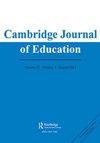The role of academic self-concept in post-compulsory achievement, transitions and labour market outcomes
IF 1.5
3区 教育学
Q2 EDUCATION & EDUCATIONAL RESEARCH
引用次数: 0
Abstract
ABSTRACT Pupils’ Academic Self-Concept (ASC) has been shown to be related to educational outcomes during compulsory school years, but there is little evidence on the role ASC plays beyond this stage. Using longitudinal data from the English Next Steps survey the authors examine whether young people with higher ASC are more likely to study A levels, participate in further education and attend university. For university attenders, they examine whether higher ASC is associated with attending high status universities or studying higher status subjects. Finally, they explore the relationship between ASC and employment status and income. They find ASC is associated with differences in some of the post-educational routes but not with all. ASC is associated with an increased likelihood of studying for A levels and, for those with the highest ASC, more ASC increases the likelihood of going to university. However, there is no evidence that ASC is associated with going to an elite Russell Group university or related to differences in subjects studied at university, nor is it directly associated with later labour market outcomes once background variables and prior educational attainment are included. However, there will be an indirect relationship which should not be overlooked, as ASC influences A levels and the likelihood of going to university, both of which are associated with improved labour market outcomes. Although not causal, this work suggests that policies aimed at increasing ASC might have the ability to improve students’ educational trajectories, increasing the likelihood that students will study A levels and, for some, increasing the likelihood of attending university. Both of these are pivotal educational cross-roads, so influencing routes at these points not only has the potential to improve opportunities for individuals, but also widen access to HE among groups with traditionally lower participation rates, thereby improving later outcomes, indirectly.学业自我概念在义务教育后成绩、转型和劳动力市场结果中的作用
摘要:学生的学术自我概念(ASC)已被证明与义务教育阶段的教育成果有关,但很少有证据表明ASC在这一阶段之后发挥作用。利用“英语下一步”调查的纵向数据,作者调查了ASC较高的年轻人是否更有可能学习A级、参加继续教育和上大学。对于大学入学者,他们研究较高的ASC是否与进入高地位大学或学习高地位学科有关。最后,他们探讨了ASC与就业状况和收入之间的关系。他们发现ASC与一些后教育途径的差异有关,但并非全部。ASC与学习A级的可能性增加有关,对于ASC最高的人来说,ASC越多,上大学的可能性就越大。然而,没有证据表明ASC与进入罗素集团精英大学或与大学学习科目的差异有关,也没有证据表明,一旦纳入背景变量和先前的教育程度,ASC与以后的劳动力市场结果直接相关。然而,这将是一种不应忽视的间接关系,因为ASC影响A水平和上大学的可能性,这两者都与劳动力市场结果的改善有关。尽管不是因果关系,但这项工作表明,旨在提高ASC的政策可能有能力改善学生的教育轨迹,增加学生学习A级的可能性,对一些人来说,增加上大学的可能性。这两个都是关键的教育十字路口,因此在这些点上影响路线不仅有可能改善个人的机会,而且还扩大了传统上参与率较低的群体获得高等教育的机会,从而间接改善后来的结果。
本文章由计算机程序翻译,如有差异,请以英文原文为准。
求助全文
约1分钟内获得全文
求助全文
来源期刊

Cambridge Journal of Education
EDUCATION & EDUCATIONAL RESEARCH-
CiteScore
5.30
自引率
4.30%
发文量
35
期刊介绍:
Cambridge Journal of Education publishes original refereed articles on all aspects of education, with a particular emphasis on work that contributes to a shared understanding amongst academic researchers, theorists, practising teachers, policy-makers and educational administrators. The journal also welcomes the submission of systematic review articles that summarise and offer new insights into specific areas of educational concern. With a wide international readership, Cambridge Journal of Education publishes contributions drawn from different educational systems and cultures enabling continued in-depth discussion of global educational theory, policy and practice. The journal’s Special Issue programme encourages and stimulates focused discussion and engagement with significant themes and responses to topics raised by readers and contributors. Cambridge Journal of Education welcomes proposals for future editions.
 求助内容:
求助内容: 应助结果提醒方式:
应助结果提醒方式:


